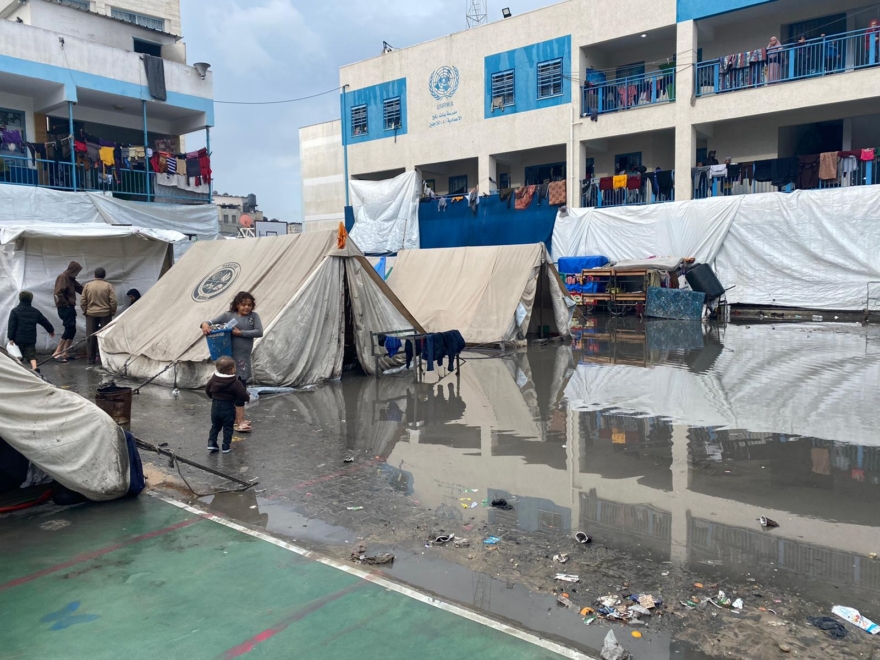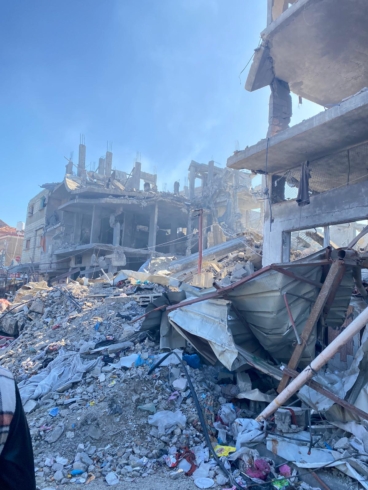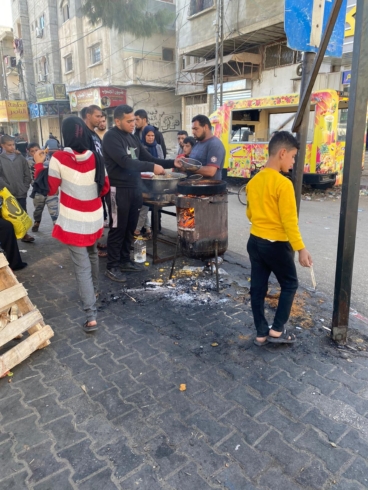

Alaa Maadi at one of the facilities set up for displaced people in the southern Gaza Strip
“Sometimes I think that I am lucky that I am alive and that no one but me will raise my child.; Other days I wake up regretting death, amidst the destruction around me and after hours of walking in search of a safe place.” Speaks Alaa Maadia young 23-year-old Gazan woman who spent several months in Murcia last year while studying at university and now survives trapped in the Gaza Strip by the Israeli army’s campaign of indiscriminate attacks that has already claimed almost 19,000 lives.
The conversation with Alaa unfolds through a series of events triggered by the daily moments in which he reconnects with the Internet and the world. Whole days could pass between these fleeting moments without hearing from her. “Sorry, I spent a few days without the Internet,” he apologizes, showing signs of life again. 3,500 kilometers away, Alaa is fighting daily in territory that has endured 16 years of siege and which, deprived of electricity and water supplies, has been subject to air attacks that have wiped out entire neighborhoods since October last year. More than half of the buildings are damaged or destroyed by lead.
“My name is Alaa Maadi; “I’m a 23-year-old Palestinian from Gaza with a double degree and a former exchange student in Spain,” she says. Alaa got married last year. His son Adam was born four months ago and he has moved with him in recent weeks to seek refuge in the southern Gaza Strip, while the Israeli army signed an agreement for a ground operation in the north and center of the 41-kilometer area. with a surface similar to that of the island of La Gomera.

Five wars, and I still haven’t gotten used to the scenes of massacres, the sounds of bombings…
“I am the daughter of a simple family, the wife of a loving husband and the mother of a small child. I have witnessed and lived through five Israeli wars and several other aggressions. Five wars and I still haven’t gotten used to the scenes of carnage, the sounds of bombing, the screams, the feeling of pain and panic,” she says from Rafah, the Gaza region bordering Egypt, where she lives with her family. The war forced 1.8 million Gazans to move to the area.
Mother looking for food for her baby
Alaa narrates scenes of overcrowding and a situation aggravated by the lack of hygiene measures, the spread of diseases and the onset of cold and monsoon seasons. The latest pictures he shares show him making his way between tents set up for displaced people, set up in the mud caused by the weather. A situation that Alaa experiences for the first time as a mother. “This war means more torture for me. I became a mother for the first time and, in addition to the fear of death, which I see up close, I discover how much more complicated simple everyday things have become,” she says.

The explosions affected the civilian population, especially women and children. Of the 18,787 deaths, according to the Gaza Ministry of Health, more than 7,700 were children and 5,000 women.. Several thousand people were missing, buried under rubble. Closures and attacks on health facilities have reduced the chances of survival for newborns like Adam, who are subjected to appalling conditions. 74 percent of hospitals in the sector are no longer operational. “How difficult it is to look for a tree branch to cook food and light a fire; how difficult it is to hold buckets of water with your hands to wash clothes and how terrible it is to worry about your parents due to a breakdown in communication,” Alaa details. His family of six brothers remains in the north.
“This war brings even more pain to me and all the people of Gaza. Brings new immigration, an unknown future and new hunger along the way.“, laments the young woman, also worried about the stress that prevents her from feeding her son, and the odyssey to find food for the baby. “Little Adam is so innocent. My body no longer produces milk due to fear and malnutrition. There is no gas to cook milk and when I light a fire I can’t find clean water to boil. Powdered milk has become in short supply in pharmacies. There were no diapers left either. I feel like I can’t cope. I lost energy, control and nerves.”
“Endless daily suffering”
UN agencies condemn the “humanitarian catastrophe” caused by Gaza survivors displaced into territory that is not even safe because they are not immune from bombing, amid a lack of medical care and supplies of basic food and medicine. Alaa provides images of the destruction he passes through: buildings collapsing as a result of the attacks; streets and squares that were completely disfigured… “Gaza is no longer Gaza. It was a whole strip, but today it is divided into three regions, starting with the northern city of Gaza, which was completely destroyed and evacuated. Now it’s full of Israeli soldiers. Some families remain there because they refuse to leave their lands,” he claims.

From brief conversations with relatives and friends who decided to stay in the north, Alaa repeats words of despair. “They say they live among tanks and are ready to die. Nobody can do anything for them. Ambulances don’t come, journalists don’t come. Nobody can save them. “It’s as if it were a grave,” he says.
Lack of fuel forced them to resort to more basic means of transportation and food. Donkey carts have replaced vehicles, and restaurants that are resisting are cooking falafel – based on chickpeas, onions, garlic and various herbs and spices – on wood-fired grills.
In the midst of desolation, Alaa learned to find the strength to stay afloat. No matter how vague the hope for the end is near. “There is endless suffering. There are always many unfinished tasks. On rainy days I wash my clothes by hand, and there are days when I wake up and don’t find anything for breakfast…,” he notes. Alaa fears this will not be his last move amid rumors that Israel plans to expel Gazans to Egypt’s Sinai Peninsula. “We don’t know where we’ll go, focusing on the south.. They can force us to move to Sinai. Nobody knows what our fate will be,” he concludes.
Source: El Independiente